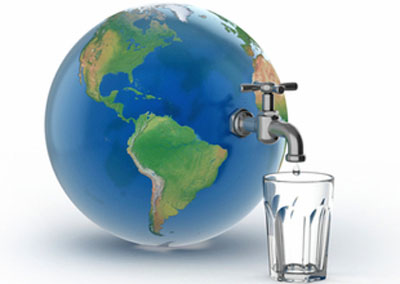|
by Shiney Varghese March 26, 2012 from AlterNet Website
Last week, even as the world celebrated
World
Water Day, some countries at the United Nations were trying to remove the
reference to the “right to water” from a document that will guide the
international development path in the coming decade.
This was followed by the United Nations Human Rights Council (UNHRC) adopting a resolution on,
The recognition of the right to water at these
United
Nations bodies, and the developments since, such as the appointment of a
Special Rapporteur on right to water and
the resolution by the World Health
Assembly recognizing right to water, have helped place water rights on the
global agenda.
Starting with the second World Water Forum in 2000, it has steadfastly refused to recognize the right to water.
This was the case at,
And yet again, in the lead up to the sixth World Water Forum earlier this month (March 12-17, 2012), the draft ministerial declaration did not clearly affirm the right to water despite the fact that it has now been recognized by both by the U.N. General Assembly and by the U.N. Human Rights Commission.
Expressing her surprise, the Special Rapporteur on right to water warned that,
This is surely a pointed reference to the slogan
of the sixth forum that "It’s time for solutions and commitments.”
The issue of whether access to safe drinking
water and sanitation is a human right was left open for interpretation.
Over 40 international and national networks and organizations issued a joint call to the 6th World Water Forum asking that,
Unfortunately the Ministerial Declaration of the World Water Forum that came out on March 13 neither took account of these suggestions nor paid attention to the warning by civil society groups that,
While the Ministerial Declaration of the 6th World Water Forum is neither legally binding, nor does it carry the political and moral authority of a UN resolution adopted in accordance with UN rules and procedures, it appears that the warning by civil society was spot on.
This week in New York a handful of governments have been trying to remove the reference to right to water from the draft outcome statement being prepared for Rio+20, the 20th anniversary of the first earth summit held in Rio in 1992. The current draft was formulated on the basis of extensive consultation with governments, private sector and civil society.
Despite many shortcomings this draft outcome
document affirms a rights based approach to sustainable development and
clearly refers to the right to water.
A clear
affirmation of these legally binding rights (as per HRC resolution and/or
national constitutions) in national and international rules, regulations and
policy documents become extremely important for pursuit of decisions that
are advantageous to vulnerable communities.
Several Rio+20 initiatives on the green economy also follow an approach that narrowly focuses on resource use efficiency and economic growth.
In the absence of effective regulatory frameworks, safeguards and the clear recognition of water as a fundamental human right, corporate interests will continue to supersede marginalized, low-income communities and smallholder farmers.
The stakes of reaffirming right to water is
especially high as we move towards Rio+20.
|

